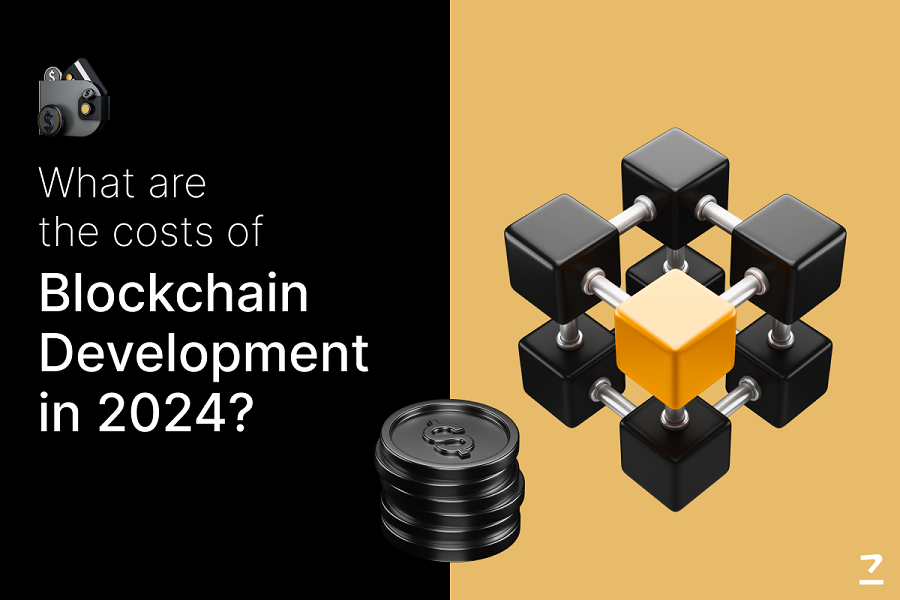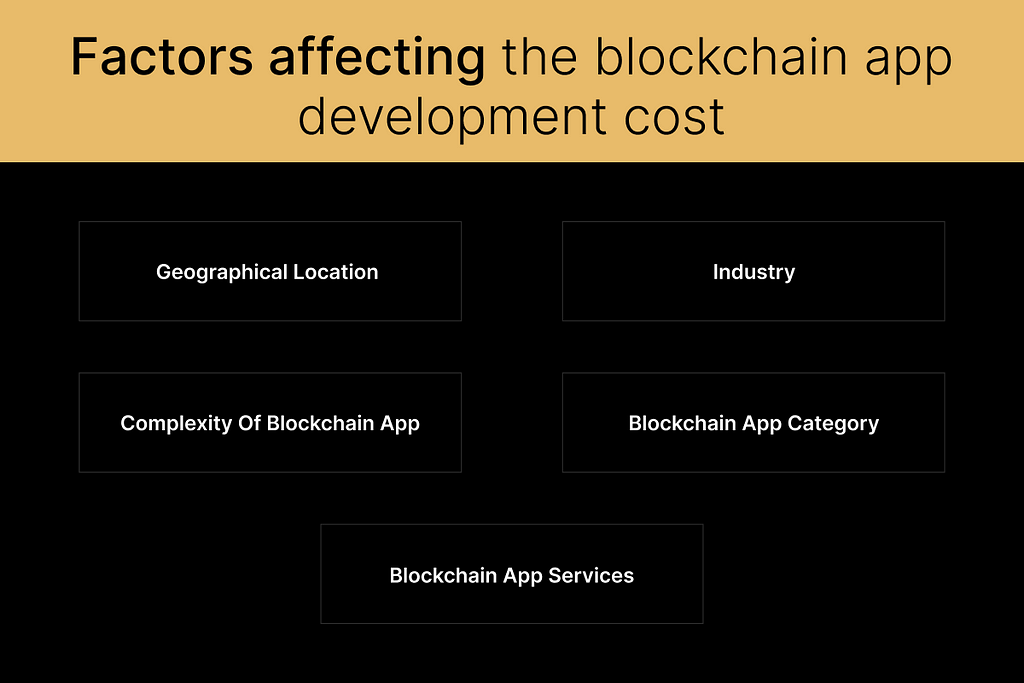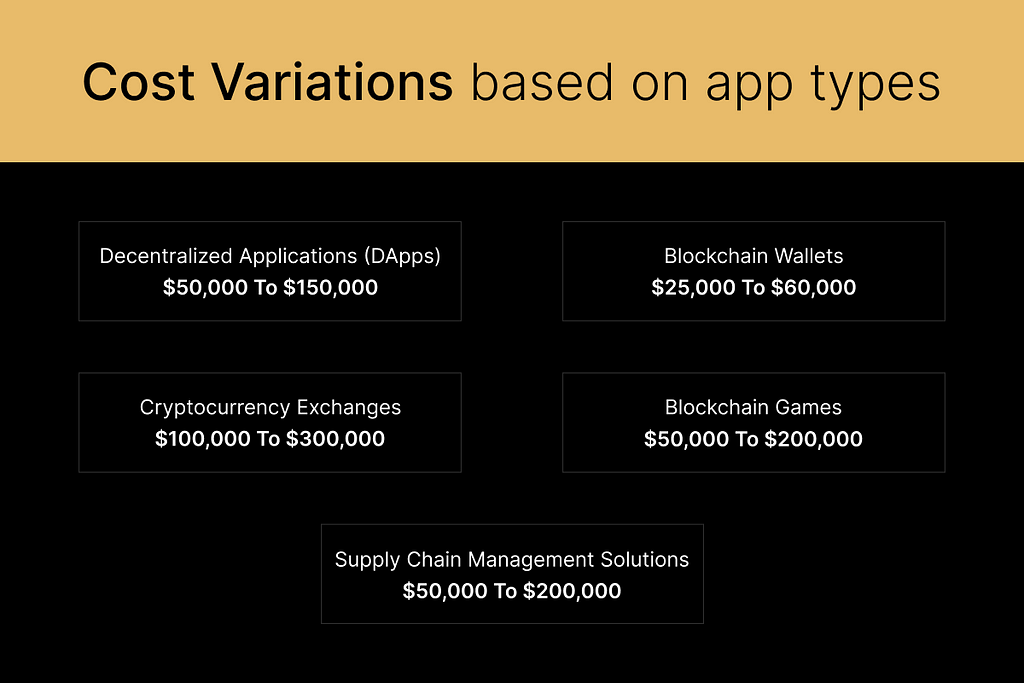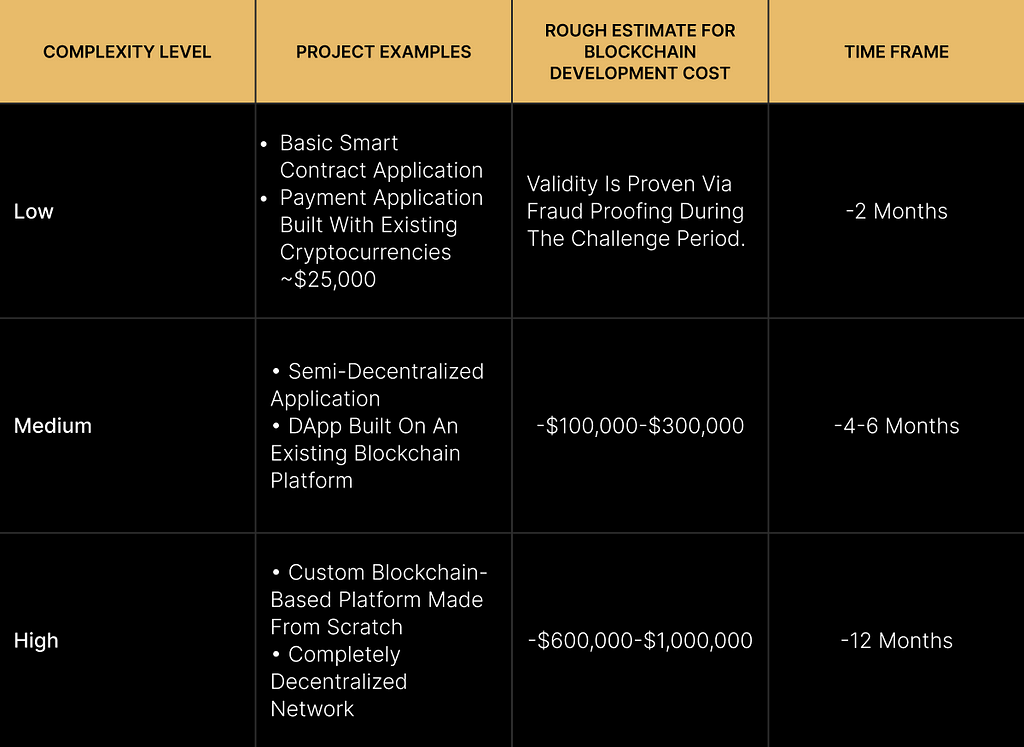
The blockchain industry is on a tear. The global blockchain technology market size is estimated to increase from $19.7 billion in 2024 to a staggering $2450.4 billion by the end of 2034. This reflects a phenomenal CAGR of 62% between now and 2034. This exponential growth can be attributed to the rising demand for blockchain applications across various sectors, including finance, supply chain management, healthcare, and retail. Furthermore, with improved transparency, security, and efficiency in data management and transactions, blockchain can redefine business operations.
As a result, the need for skilled blockchain developers has never been greater. However, determining the exact cost of enterprise blockchain development can be challenging, as it depends on various factors such as project complexity, industry, and the geographical location of the development team. Worry not! This article aims to uncover the costs associated with blockchain development in 2024, providing a comprehensive breakdown of the factors that influence the overall expenses. By understanding these key elements, businesses can make informed decisions and allocate their resources effectively when undertaking blockchain projects.
Understanding Blockchain Development Costs
Unlike traditional software projects, the cost of blockchain development is not a one-size-fits-all proposition. Instead, it is influenced by a variety of factors.

- The complexity of the project: The more intricate functionalities and features you integrate, the more intricate (and potentially more expensive) the development process becomes.
- The industry the project serves: Regulations and compliance requirements specific to your industry can significantly impact the development costs.
- The type of blockchain app being developed: Are you building a complex decentralized application (dApp) or a more optimized blockchain wallet? The nature of your application directly influences development needs and, consequently, the cost.
- The geographical location of the development team: The location of your development team can influence the overall cost due to varying developer rates across the globe.
Breakdown by Development Costs
The process of blockchain app development can be broadly divided into several key stages, each with its own set of associated costs.

Concept & Planning
The initial stage of blockchain development lays the foundation for the entire project.
It involves:
- Ideation: Brainstorming your vision, defining the problem your application will solve, and identifying target users.
- Feasibility Analysis: Assessing the technical viability of your concept and exploring potential challenges.
- Technical Requirements Outlining: Detailing the functionalities and features your application will possess.
While the concept stage is relatively inexpensive, the feasibility analysis and technical outlining might involve consultations with blockchain experts, incurring some initial costs. As a rough estimate, expect this stage to consume around 5–10% of your total development budget.
Design & Development
Once the concept is solidified, the next step is the design and development phase. This includes creating the user interface and user experience (UI/UX) design, developing smart contracts, selecting the appropriate blockchain platform, and integrating the solution with any existing systems (if applicable). Depending on the complexity of the project, this stage accounts for 50–60% of the total development costs, as it accounts for the bulk of the project budget due to the involvement of developers, designers, and potentially blockchain specialists.
Testing & Deployment
Before the blockchain solution can be launched, it must undergo rigorous testing to ensure its functionality, security, and scalability. This includes conducting security audits, fixing any identified bugs, and preparing the application for deployment on the chosen blockchain platform. The costs associated with this stage account for 15–20% of the total budget, depending on the chosen blockchain platform.
Maintenance & Support
Even after the successful deployment of the blockchain solution, ongoing maintenance and support are crucial to maintain its continued performance and security. This includes regular bug fixes, updates, and feature enhancements. Businesses can expect to allocate 10–15% of the total budget annually for maintenance and support, depending on the project’s requirements.
Cost Variations Based on App Types
The cost of blockchain development can vary considerably depending on the type of application being built. Here are some common app types and the factors influencing their development costs.

Decentralized Applications (dApps)
Decentralized applications (dApps) are blockchain-based applications that run on a decentralized network, offering improved security, transparency, and immutability. The development of dApps typically involves the creation of smart contracts. Complex functionalities translate to intricate smart contracts, which can significantly increase development costs. Further, dApp development also involves utilizing decentralized storage. Storing data on a decentralized network like IPFS can be more expensive compared to traditional centralized storage options. Essentially, the cost of developing a dApp can range from $50,000 to $150,000, depending on the project’s scope and the specific features required.
Blockchain Wallets
Blockchain wallets are applications that allow users to store, send, and receive digital assets securely. The development costs for blockchain wallets can vary significantly based on the type of wallet being built. Custodial wallets, which are managed by a third-party service, generally cost between $25,000 to $60,000 to develop. Non-custodial wallets, which give users full control over their private keys, can cost between $40,000 to $100,000 due to the added complexity of key management and security features.
Cryptocurrency Exchanges
Cryptocurrency exchanges are platforms that enable the trading of digital assets. These applications require a high level of security, scalability, and compliance, making them one of the most complex and expensive blockchain projects to develop. The cost of building a cryptocurrency exchange can range from $100,000 to $300,000, depending on the exchange’s features, trading volume, and regulatory requirements.
Blockchain Games
Blockchain games leverage the unique properties of blockchain technology, such as in-game economies, non-fungible tokens (NFTs), and decentralized ownership. The development of these games can be quite complex, as it involves integrating blockchain protocols, creating digital assets, and designing engaging gameplay mechanics. The cost of developing a blockchain game can range from $50,000 to $200,000, depending on the game’s complexity and the specific features being implemented.
Supply Chain Management Solutions
Blockchain-based supply chain management solutions aim to improve transparency, traceability, and efficiency in the movement of goods and materials. These applications often require integrating blockchain technology with existing enterprise systems, which can considerably increase development costs. The cost of building a blockchain-based supply chain management solution can range from $50,000 to $200,000, depending on the complexity of the integration and the specific requirements of the project.
Complex and Cost Correlation
The complexity of a blockchain project is directly proportional to its development costs. As the project’s scope and requirements become more intricate, the time and resources required to build the application increase, leading to higher overall expenses. Here are the factors that illustrate this correlation.

Advanced Features and Functionalities
Implementing advanced features and functionalities can notably impact the development costs of a blockchain project. For example, building a decentralized finance (DeFi) application with complex lending and borrowing mechanisms can cost between $150,000 to $300,000, as it requires developing smart contracts, implementing risk management algorithms, and facilitating regulatory compliance.
Custom Integrations
Integrating blockchain technology with existing enterprise systems can be a complex and costly endeavor. For instance, developing a blockchain-based supply chain management solution that integrates with an organization’s ERP system can cost upwards of $200,000. This is because the development team must not only build the blockchain application but also ensure smooth data exchange and compatibility with the existing infrastructure.
Scalability and Performance
As blockchain applications gain traction and attract more users, scalability and performance become critical factors. Developing a highly scalable blockchain network capable of processing thousands of transactions per second can cost between $100,000 to $300,000, depending on the specific requirements and the chosen blockchain platform. This is because the development team must optimize the network’s architecture, implement sharding or layer-2 solutions, and conduct extensive testing so that the application can handle increased traffic without compromising performance.
Security and Compliance
Blockchain applications, particularly those dealing with sensitive financial data or high-value transactions, require efficient security measures and compliance with industry regulations. Building a secure blockchain application that meets stringent security standards and regulatory requirements can cost between $75,000 to $200,000, depending on the specific security features, penetration testing, and compliance audits required.
Industry-Specific Cost Considerations
The cost of developing your blockchain application can also be influenced by the specific industry you’re targeting. Different industries have unique regulatory requirements, data security considerations, and integration needs that can impact the development process.
Finance
The financial sector is one of the early adopters of blockchain technology, with applications ranging from cryptocurrency exchanges and decentralized finance (DeFi) platforms to cross-border payments and trade finance. Developing blockchain solutions for the finance industry typically costs between $100,000 to $300,000 due to the need for robust security measures, regulatory compliance, and complex integrations with existing financial systems.
Healthcare
Blockchain-based applications in the healthcare industry focus on areas like secure medical data management, supply chain traceability, and clinical trial record-keeping. The development costs for these solutions can range from $25,000 to $150,000, as they often require integration with electronic health record (EHR) systems and compliance with strict data privacy regulations.
Logistics and Supply Chain
Blockchain technology is reshaping the logistics and supply chain industry by boosting transparency, traceability, and efficiency. Developing blockchain-based supply chain management solutions can cost between $50,000 to $200,000, depending on the complexity of the integration with existing enterprise resource planning (ERP) systems and the number of stakeholders involved.
Real Estate
Blockchain is being utilized in the real estate industry for applications such as property ownership records, rental management, and fractional ownership of properties. The development costs for these solutions can range from $50,000 to $150,000, as they often involve integrating with land registry systems and implementing smart contracts for various real estate transactions.
Gaming
Blockchain-based games tap into the technology’s unique features, such as in-game economies, non-fungible tokens (NFTs), and decentralized ownership. The development of these games can cost between $50,000 to $200,000, depending on the complexity of the game mechanics, the integration of blockchain protocols, and the creation of digital assets.
Energy and Utilities
Blockchain is being used in the energy and utilities sector for applications like peer-to-peer energy trading, renewable energy certificates, and grid management. The development costs for these solutions can range from $75,000 to $200,000, as they often require integrating with existing energy management systems and implementing complex smart contracts.
Government and Public Sector
Blockchain technology is being explored by governments and public sector organizations for applications like digital identity management, land registry, and supply chain transparency. The development costs for these solutions can vary from $70,000 to $150,000, as they may involve integrating with legacy government systems and maintaining compliance with strict data privacy and security regulations.
Geographical Distribution of Development Teams
The location of your development team can play a vital role in shaping the overall cost of your blockchain project.
- Developer Experience: Regions like North America and Western Europe tend to have a higher concentration of experienced blockchain developers. While this translates to potentially higher hourly rates, it also provides access to a skilled workforce capable of handling complex projects efficiently.
- Hourly Rates: Developer rates vary considerably across regions. Generally, North America and Western Europe have the highest hourly rates, followed by regions like Latin America and Eastern Europe. Locations like Southeast Asia and parts of South Asia might offer lower hourly rates, but the talent pool might require more careful vetting to ensure the necessary skillset.
Finding the Right Balance
It’s important to strike a balance between cost and expertise when choosing a development team location. Here’s a simplified overview of potential regions and considerations.
Blockchain developers in North America, particularly in tech hubs like Silicon Valley, command some of the highest hourly rates in the industry, ranging from $30 to $70 per hour. This is due to the high demand for blockchain expertise and the region’s established reputation as a global technology leader. However, the project management and overhead costs associated with North American development teams can also be higher.
In contrast, blockchain developers in Latin American countries like Mexico, Colombia, and Brazil tend to have lower hourly rates, typically ranging from $20 to $50 per hour. While the technical expertise may be on par with North American developers, the overall project costs can be more favorable due to the lower cost of living and project management expenses in these regions.
Blockchain developers in Western and Northern European countries, such as the United Kingdom, Germany, and the Nordics, generally charge hourly rates between $25 to $60. These regions are known for their strong technical talent and efficient blockchain ecosystems, but the project costs can be higher than in some other parts of the world due to the higher cost of living.
Blockchain development teams in the Middle East, South, East, and Central Africa regions often have lower hourly rates, ranging from $15 to $40 per hour. However, the availability of experienced blockchain developers in these regions may be more limited, and the project management costs can be higher due to potential infrastructure and communication challenges.
Blockchain developers in Southeast Asian countries like India, Vietnam, and the Philippines typically have hourly rates between $10 to $40. These regions are known for their large talent pools and competitive pricing, making them an attractive option for businesses looking to optimize their blockchain development costs. However, the project management and quality assurance processes may require more oversight to achieve the desired outcomes.
Blockchain developers in Eastern Asian countries, such as China and South Korea, often have hourly rates ranging from $20 to $50. These regions have established blockchain ecosystems and a growing pool of skilled developers, but the project costs can be influenced by factors like language barriers and cultural differences.
Additional Cost Factors
While the factors discussed so far are the primary drivers of blockchain development costs, there are a few additional considerations that can impact the overall expenses.
Third-Party API Integrations
Integrating third-party APIs into a blockchain application can add complexity and cost to the development process. Depending on the specific APIs required, the integration effort can range from a few thousand dollars to tens of thousands, depending on the complexity of the API and the level of customization needed.
Security Audits
Engaging reputable security firms to conduct thorough audits of your blockchain application is highly recommended. While this adds to the initial cost, it’s a crucial investment to identify and address vulnerabilities before launch.
Ongoing Maintenance and Support Contracts
Blockchain applications require ongoing maintenance and support to offer smooth operation, fix bugs, and implement new features. Budgeting for these ongoing costs is essential for the long-term success of your project.
Cost-Saving Strategies
Developing a blockchain application can be a considerable investment but there are several strategies businesses can employ to optimize their costs and deliver a successful project.
Utilize Open-Source Blockchain Platforms
Open-source blockchain platforms like Ethereum, Hyperledger Fabric, and Corda offer a cost-effective alternative to building a blockchain solution from scratch. These platforms provide a strong foundation, pre-build components, and a thriving developer community, allowing businesses to save on development time and resources.
Utilize Pre-Built Templates and Libraries
Many blockchain development companies and open-source communities offer pre-built templates, libraries, and frameworks that can be customized to meet specific business requirements. Utilizing these resources can substantially reduce development time and cost, as the core functionality is already in place.
Explore Cost-Effective Development Locations
As discussed earlier, the geographical location of the development team can have a significant impact on the overall project costs. Businesses can consider partnering with blockchain development teams in regions like Latin America, Southeast Asia, or Eastern Europe, where hourly rates are generally lower while maintaining a high level of technical expertise.
Adopt a Phased Rollout Approach
Instead of attempting to build a comprehensive blockchain solution in a single phase, businesses can consider a phased rollout approach. This involves breaking down the project into smaller, manageable milestones and implementing them incrementally. This strategy can help optimize costs, reduce risks, and maintain a more manageable development process.
Collaborate with Experienced Development Partners
Partnering with an experienced blockchain development company can be a cost-effective strategy in the long run. These partners can provide valuable insights, harness their expertise, and help businesses avoid common pitfalls that can lead to budget overruns. Furthermore, they can offer ongoing maintenance and support, foolproofing the longevity and success of the blockchain application.
Optimizing Blockchain Development Costs by Partnering with Codezeros
At Codezeros, we understand the critical role of cost optimization in blockchain development. Our experienced team has a deep understanding of the factors that influence project costs, allowing us to provide accurate estimates and effective strategies to manage budgets. By working closely with clients to define project scope, identify cost drivers, and develop a roadmap aligned with their timeline and budget, we help avoid costly changes or scope creep. With a proven track record of delivering high-quality blockchain solutions, our expertise in working with various platforms, integrating systems, and implementing efficient security measures ensures successful project deployment while optimizing costs.
If you’re considering blockchain technology for your business, reach out for a consultation. Our experts will provide a detailed cost estimate and develop a tailored solution that aligns with your objectives and budget. Contact us today to get started.
Originally published at https://www.codezeros.com.
How Much Does Blockchain Development Cost in 2024 was originally published in Coinmonks on Medium, where people are continuing the conversation by highlighting and responding to this story.








